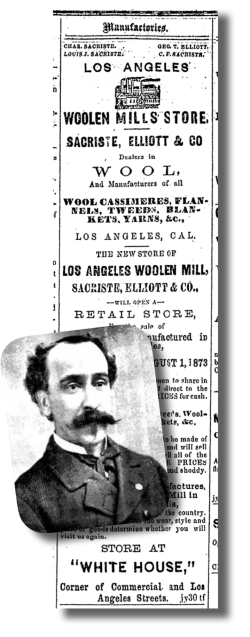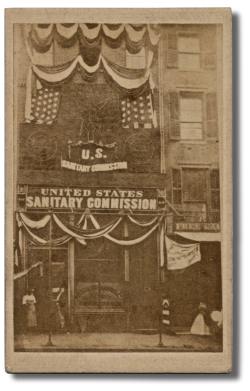
This letter was penned by Louis Jeanottelle Sacriste (1843-1904), the son of Charles Sacriste (1815-1867) and Annie O’Neil (1822-1895) of New Castle county, Delaware. From the 1850 US Census we learn that Louis’ father was a native of France—a “dyer” by trade. His mother was born in Ireland. The family lived a couple of years in Delaware before moving into Spring Garden Ward 7 in Philadelphia in the late 1840’s.
Louis enlisted on 1 September 1862 as a 2nd Lieutenant in Co. F, 116th Pennsylvania volunteers—a regiment that would win fame as part of the Irish Brigade. He was promoted to 1st Lieutenant of Co. D on 1 March 1863, to Adjutant on 21 November 1863, and to Captain of Co. D on 22 September 1864. On March 13, 1865 he was promoted to Brevet Major. He was wounded at Cold Harbor on 3 June 1864 and mustered out with his company on 3 June 1865.
Louis was awarded the Medal of Honor as a 1st Lieutenant in Co. D, 116th Pennsylvania Infantry for action on May 3 and October 14, 1863 at Chancellorsville and Auburn, Virginia. His citation reads “Saved from capture a gun of the 5th Maine Battery. Voluntarily carried orders which resulted in saving from destruction or capture the picket line of the 1st Division, 2d Army Corps.”
After the conclusion of the war, Louis accepted a Captaincy in the regular army with Hancock’s Corps. Several years later he was found in Los Angeles, California, with his father where they operated a “Woolen Mills Store”—a retail establishment at the corner of Commercial and Los Angeles Streets specializing in woolen goods manufactured in Los Angeles. In the mid 1870’s, Louis had an unsuccessful bid for mayor of Los Angeles. At that time he was also serving as captain of the Los Angeles Guard—the National Guard of California.
Louis wrote the letter to Cecelia (McBride) Brady, the wife of 1st Lt. Eugene Brady (1832-1865), Co. D, 116th P. V., who was killed at the Battle of Five Forks on 31 March 1865 in the closing days of the war. Eugene had previously been wounded on 2 July 1863 at Gettysburg but recovered to join his regiment. From the 1860 US Census we learn that Louis was a native of Ireland and that he worked as a policeman in Philadelphia. His wife, Cecelia McBride (1837-1899), was also born in Ireland. Enumerated in the residence at the same time were their two children, Catharine Brady (age 3) and Thomas F. Brady (age 1) and Cecelia’s mother, Catharine McBride (age 65). One other occupant at their 1518 State Street residence was a 29 year old woman named Rose Ferry, a seamstress, and probably also a relative. [Another child named Cecelia Brady was born just before or even after Eugene’s death in 1865.]
In the 1880 US Census, the widow Cecelia Brady resided with her three children—Kate, Thomas and Cecelia—at 1529 Vine Street in Philadelphia. Thomas F. Brady (1859-1920) grew up to be a customs inspector in Philadelphia.
Eugene has two grave markers—one in the Old Cathedral Cemetery in Philadelphia and one in the Poplar Grove National Cemetery (Div. D, Sec. B, Grave 59) in Virginia. Given that Louis went to the expense of having Eugene’s body embalmed, it’s difficult to believe that his body was not subsequently sent home to Philadelphia for burial although there is an annotation in Brady’s military burial record that indicates he was first buried on “Burgess’ Farm” which suggests a body was removed from that location when establishing the national cemetery.
Although I can’t be certain he is the same man, there was a Eugenius (Eugene) Brady baptized on 27 April 1832 in Drumgoon, Cavan, Ireland in the parish of Cooteville. His parents were identified as Eugene Brady and Maria Crosson.
[Note: This letter is from the personal collection of Jim Doncaster and is published by express consent.]

TRANSCRIPTION
Camp of the 116th Pennsylvania Vols.
April 16, 1865
Mrs. E. Brady
Respected friend,
You have received already the painful intelligence of your brave husband’s death. I was but a short distance from him when he fell. His last words were, “Oh God, my wife and children.” I had his body taken to division hospital, embalmed, and sent home. I would have written to you before, but we have been constantly moving and fighting and our present camp is our first resting place. I have his valise and clothes, his sword, pocket book containing $16.50, photographs &c. which I will send to you the first safe opportunity. His pistol was lost by Sergt. [Peter] Kelly on the battlefield.

I feel happy in informing you that after his return to the regiment from furlough he attended his religious duties, his confession and communion. At a meeting of the officers of the regiment, preamble and resolutions were adopted and sent on for publication. A copy was also ordered to be sent to you. Myself and company feel very sorry at his loss as do all the officers and men of the regiment. I do not think he had an enemy in the army.
At the time of his death there was three month [pay] due him which can be collected very easily and free o charge. You can have your pension arranged also free of charge and promptly by calling on W. N. Ashman, Solicitor, No. 1307 Chestnut Street, US Sanitary Commission. He is paid by the commission to attend to settling the claims of the deceased soldiers. He does his business with great promptness. I would not advise you to employ a lawyer or a pension agent as they will charge too much.
Please write, and if in any way I can assist you or do any business for you, I shall be happy to accommodate you.
Your friends — Louis J. Sacriste, Capt. Co. D


